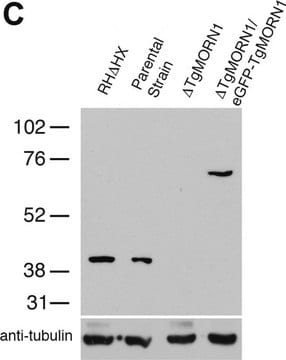T9822
Anti-Tubulin, Polyglutamylated antibody, Mouse monoclonal
clone B3, purified from hybridoma cell culture
Synonym(s):
Anti-K-ALPHA-1
About This Item
Recommended Products
biological source
mouse
Quality Level
conjugate
unconjugated
antibody form
purified immunoglobulin
antibody product type
primary antibodies
clone
B3, monoclonal
form
buffered aqueous solution
mol wt
antigen ~50 kDa
species reactivity
mouse, sea urchin (Lytechinus pictus and three others.), bovine, monkey, rabbit, human, rat, Oxyrrhis marina (dinoflagellate), chicken
technique(s)
immunocytochemistry: suitable
indirect ELISA: suitable
microarray: suitable
western blot: 0.5-1 μg/mL using cytosolic fraction of rat brain extract
isotype
IgM
UniProt accession no.
shipped in
dry ice
storage temp.
−20°C
target post-translational modification
unmodified
Gene Information
human ... TUBA4A(7277) , TUBB(203068)
mouse ... Tuba1a(22142) , Tubb2b(73710)
rat ... Tuba1a(64158)
General description
Immunogen
Application
Immunocytochemistry (1 paper)
Western Blotting (1 paper)
- immunoprecipitation
- immunohistochemistry
- immunofluorescence
Biochem/physiol Actions
Physical form
Disclaimer
Not finding the right product?
Try our Product Selector Tool.
Storage Class Code
10 - Combustible liquids
WGK
WGK 3
Flash Point(F)
Not applicable
Flash Point(C)
Not applicable
Choose from one of the most recent versions:
Certificates of Analysis (COA)
Don't see the Right Version?
If you require a particular version, you can look up a specific certificate by the Lot or Batch number.
Already Own This Product?
Find documentation for the products that you have recently purchased in the Document Library.
Customers Also Viewed
Articles
Microtubules of the eukaryotic cytoskeleton are composed of a heterodimer of α- and β-tubulin. In addition to α-and β-tubulin, several other tubulins have been identified, bringing the number of distinct tubulin classes to seven.
Our team of scientists has experience in all areas of research including Life Science, Material Science, Chemical Synthesis, Chromatography, Analytical and many others.
Contact Technical Service











